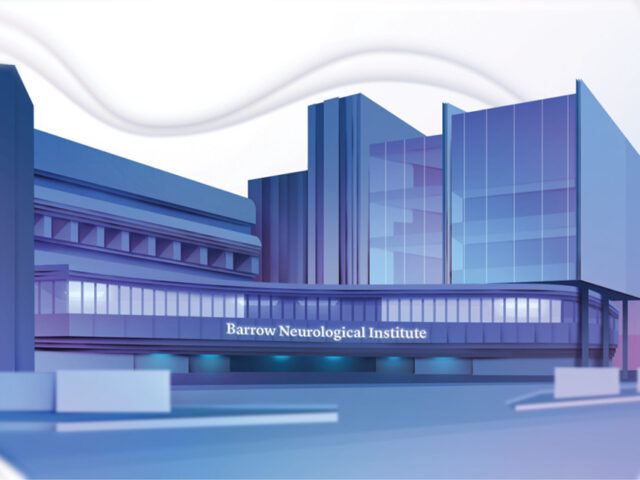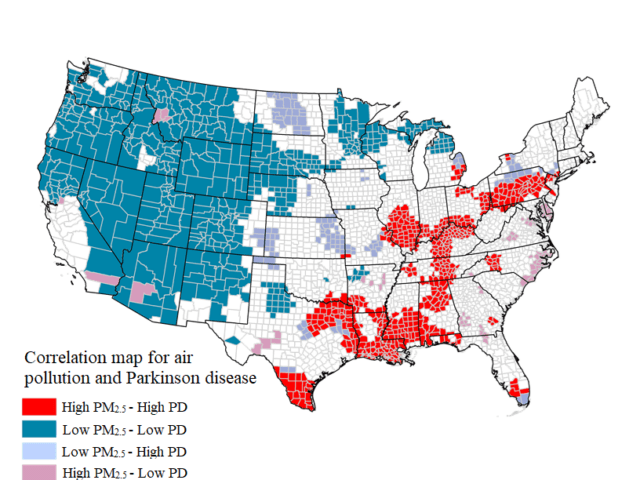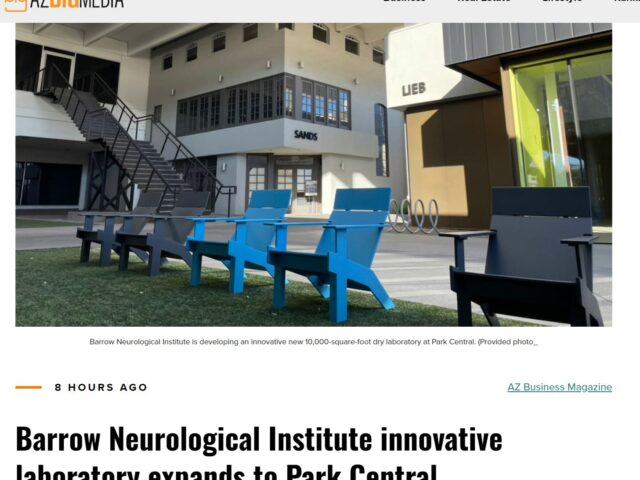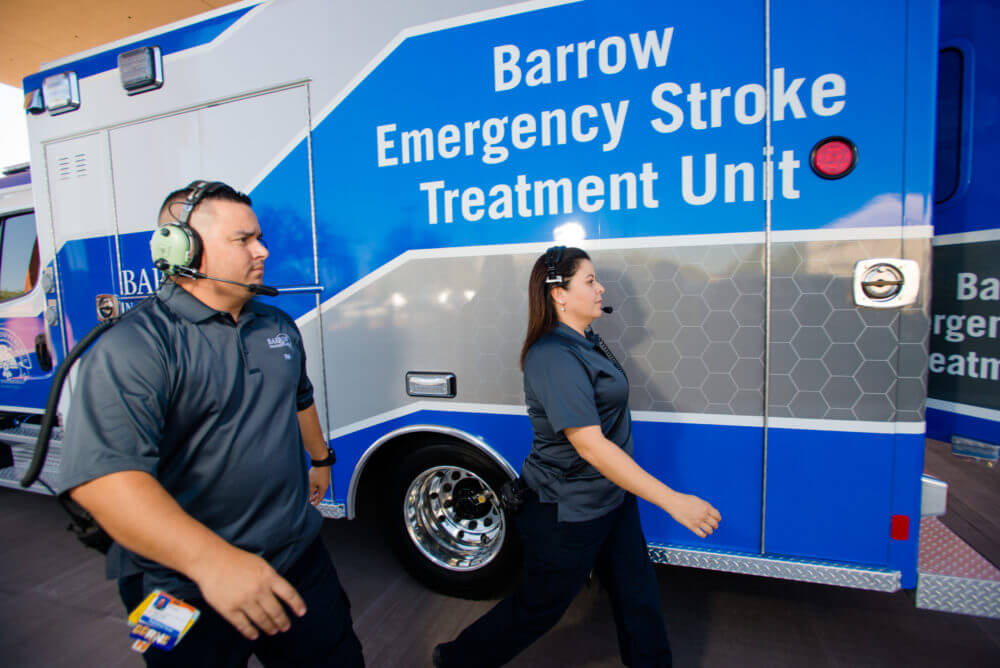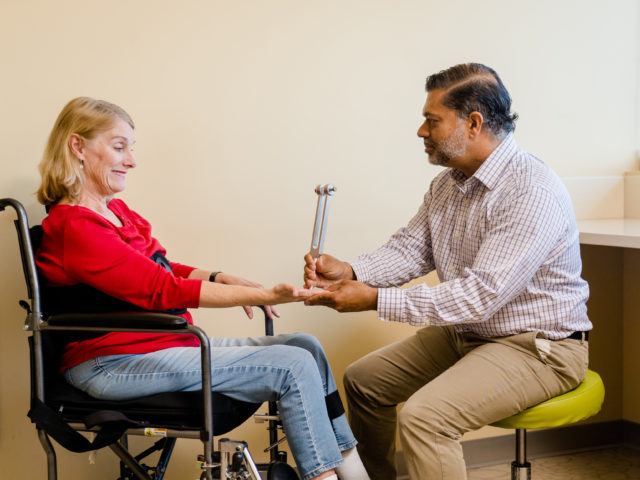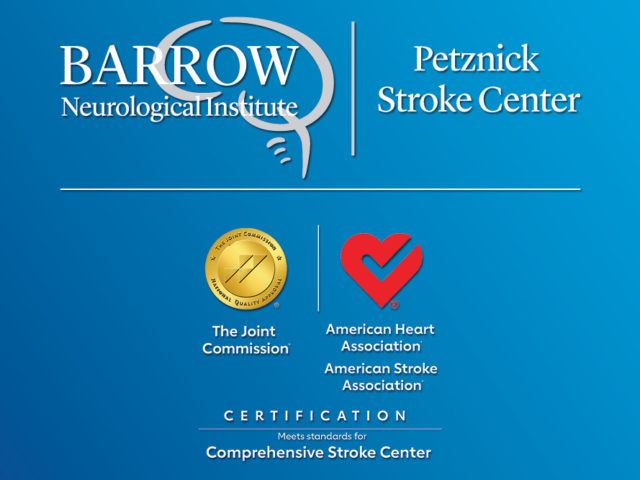
Department of Neurology
Our Mission
The Department of Neurology at Barrow Neurological Institute, chaired by Brad A. Racette, MD, FAAN, is an academic neurology department with a traditional tripartite mission: providing cutting-edge clinical care to patients with neurologic diseases, training the next generation of physician-leaders, and conducting clinically relevant research. The Barrow Department of Neurology has a strong commitment to global neurology across these three mission areas.
The Department of Neurology is composed of a diverse faculty of more than 60 neurologists, scientists, and other providers who deliver compassionate and patient- and caregiver-focused care across 13 subspecialties. Barrow neurologists are internationally recognized leaders in their respective specialties. Our physicians are deeply committed to health equity, as evidenced by unique outreach programs in most subspecialties, a free neurology clinic at St. Vincent de Paul, and a continuity neurology clinic on the San Carlos Apache Reservation.
Barrow Neurology trains residents and fellows to be national and international leaders in clinical care, service, global neurology, and research. Trainees benefit from a rich clinical environment and talented clinician-educators who oversee our training program. Student-doctors from Creighton University Medical School and the University of Arizona College of Medicine learn neurology from the Barrow residents and attendings in an institute dedicated to clinical neuroscience. Trainees can also experience global neurology by rotating at Chris Hani Baragwanath Hospital in Soweto, South Africa through our Barrow Global Neurology Program, offered in partnership with the University of the Witwatersrand in Johannesburg.
Barrow researchers are dedicated to clinically relevant research that is tightly aligned with the needs of our patients. Barrow Department of Neurology research spans the spectrum from translational neuroscience to clinical research, including neuroepidemiology data science, neuroimaging, biofluid multi-omic analyses, basic science, and investigator-initiated clinical trials. The Barrow Neuro Analytics Center is a 10,099-square-foot dry lab research facility focusing on data science from large populations to deep phenotyping of human research participants and cells.
Designated Centers of Excellence and Recognitions
- ALS – ALS Association Certified Treatment Center of Excellence
- Alzheimer’s & Cognitive Disorders – Lewy Body Dementia Association Center of Excellence
- Ataxia – National Ataxia Foundation Center of Excellence
- Epilepsy – National Association of Epilepsy Centers – Level 4 Comprehensive Epilepsy Center
- Hereditary Neuropathy – Hereditary Neuropathy Foundation CMT Center of Excellence
- Huntington’s Disease – Huntington’s Disease Society of America Center of Excellence
- Multiple Sclerosis – National Multiple Sclerosis Society Center for Comprehensive Care
- Muscular Dystrophy – Muscular Dystrophy Association Care Center
- Parkinson’s Disease – Parkinson Foundation Center of Excellence
- Stroke – The Joint Commission and American Heart Association/American Stroke Association Certified Comprehensive Stroke Center; American Heart Association 2024 Get With The Guidelines Stroke Gold Plus Quality Achievement Awards, Target: Stroke Honor Roll, Target: Type 2 Diabetes Honor Roll
- Alzheimer’s and Memory Disorders
- Balance Disorders & Neuro-Otology
- Brain Injury & Sports Neurology
- Epilepsy
- Headache Medicine
- Movement Disorders
- Multiple Sclerosis & Neuro-Immunology
- Neurocritical Care
- Neuro-Endocrinology & Pituitary
- Neuromuscular Disorders
- Neuro-Ophthalmology
- Neurovascular & Stroke
Specialists
Faculty

Gill Nelson, PhD, MSc
Neurology
Fellows
Residents
Medical Education
Clinical and Laboratory Research
Enroll HD is a longitudinal, observational, multinational study that will integrate two existing Huntington’s Disease registries, REGISTRY in Europe and COHORT in North America and Australia, while also expanding to include sites in Latin America and Asia. The goal is the build a large and...
The purpose of this program is to create a postmortem (after death) tissue bank of spinal cord, muscle, and brain tissue samples from both amyotrophic lateral sclerosis (ALS) patients and those without the disease (control subjects). Tissue donation provides an important and vital resource toward...
The LSD Registry program is a multi-center, international, observational program for patients with certain rare diseases designed to track the natural history and outcomes of patients. Currently, patients diagnosed with Pompe disease may participate in this registry program. No experimental intervention is given; thus, a...
About FDA-approved multiple sclerosis (MS) disease-modifying therapies (DMTs) target the relapsing phase of MS but have minimal impact once the progressive phase has begun. It is unclear if, in the relapsing phase, there is an advantage of early aggressive therapy with respect to preventing long-term...
Blinded comparison of different alpha-synuclein seeding assays as cutaneous biomarkers of Lewy body dementias. Beach-NIH/R01 (NS118669-01). Purpose The purpose of this research is to determine the ability of skin biopsy analysis to predict a diagnosis of Lewy body dementia, and to determine whether the results...
PPMI 2.0 is a broad program, expanding the goals of the original PPMI study (NCT01141023), that includes this PPMI 2.0 Clinical protocol, as well as the PPMI 2.0 Remote, PPMI 2.0 Digital Applications and PPMI 2.0 Online protocols. All participants in PPMI 2.0 will be...
The purpose of this platform trial is to evaluate the efficacy of multiple investigational drugs at once, as compared with a shared placebo group, on ALS disease progression. New treatment regimens (drugs) will be added as they become available within the trial, meaning that multiple...
This is a phase 3 double blind, placebo controlled study evaluating the efficacy and safety of AL001 administered intravenously in participants at risk for or with frontotemporal dementia due to heterozygous mutations in the progranulin gene. Full Name: A Phase 3 Study to Evaluate Efficacy...
This research is being done to figure out whether treatment for sleep apnea, in people who have had a stroke or TIA, improves recovery from stroke, and helps prevent future stroke, heart problems, and death. The intervention being tested is called continuous positive airway pressure...
StATins Use in intRacereberal hemorrhage patieNts (SATURN) This research is being done to find out if it is better to continue or discontinue statin drugs in people who had a brain hemorrhage while taking a statin drug. Statin drugs help prevent heart disease and ischemic...
Target ALS Biomarker Study: Longitudinal Biofluids, Clinical Measures, and At-Home Measures The purpose of this study is to generate a biorepository of longitudinal blood (plasma and serum), cerebral spinal fluid (CSF), and urine linked to genetics and clinical information, and at-home functional measures that are...
What is the FASTEST Trial? Barrow Neurological Institute is conducting a research study of the emergency treatment of patients with bleeding in the brain, also called intracerebral hemorrhage. Barrow Neurological Institute has joined a partnership of over 100 other hospitals and mobile stroke units across North...
DISCOVERY is a prospective, multicenter, observational, nested-cohort study with the overarching objectives to identify specific stroke subtypes associated with risk of PSCID in diverse US populations and elucidate mechanisms of PSCID through systematic assessment of the effect of acute stroke and its interaction with antecedent...
Purpose This study will test a new deep brain stimulation (DBS) site that is expected to better address these features of Parkinson’s disease. Who Can Participate Parkinson’s disease patients that are discussing deep brain stimulation therapy with their physician and have difficulties with gait, balance,...
Development of a central repository for Parkinson’s disease-related genomic data for future research. Purpose This study will obtain genetic samples to investigate the genetic link to Parkinson’s disease. Patients can receive their genetic results if they wish. Who Can Participate Male and female patients over...
A phase-2B, double-blind, randomized controlled trial to evaluate the activity and safety of inebilizumab in anti-NMDA receptor encephalitis and assess markers of disease. About There are currently no medicinal products approved for the treatment of anti-N-methyl-D-aspartate receptor (NMDAR) encephalitis, a rare disease. NMDAR encephalitis is...
Purpose The purpose of the study is to assess the feasibility and impact of time-restricted eating on cognitive performance and blood biomarkers of metabolic health in adults with mild cognitive impairment. We will collect characteristics that are associated with cognitive function and cognitive decline (e.g....
Purpose The ABATE Study is testing an investigational vaccine for Alzheimer’s disease in people with Down Syndrome. We want to see if the vaccine is safe. We also want to see if it slows the progression of Alzheimer’s disease in people with Down syndrome. The...
Purpose This study is a multicenter, biologic samples, and health-related data collection. The purpose of this study is to establish a collection of health-related data and biological samples that will enable researchers to understand the cause of cryptogenic new-onset refractory status epilepticus (NORSE), to identify...
Purpose Epilepsy Learning Health System (ELHS), Epilepsy Surgical Materials Feedback Survey, and Mindset The purpose of the network is to improve seizure control and quality of life for people with epilepsy through a learning healthcare system, in which clinical data is collected, analyzed, and rapidly...
About the Study This study, funded by the State of Arizona Governor’s Office through the American Rescue Plan Act, aims to analyze if long COVID: Eligibility Patients are eligible to participate in the study if they are: Principal Investigators Enrollment Contact Phone: (602) 406-6408Email: HumanNeuroscience@CommonSpirit.org
About The long-term health outcomes of people living with multiple sclerosis (MS) and other neuroImmunology diseases are not well known. Barrow Neurological Institute is building a database that stores patient health data used to gain knowledge and identify trends in outcomes in patients suffering from...
About MS causes significant disability and costs in those affected, but those burdens are not distributed equally. Minority populations including Black and Latinx have worse outcomes in MS than whites. The reasons for these disparities are not well understood but are likely in part due...
About The development of disease modifying therapies for relapsing forms of multiple sclerosis (MS) has led to significant decrease of morbidity for people with MS. For individuals with relapsing-remitting MS, disability worsening starts from disease onset, and more than 50% of patients evolve to secondary...
A Phase II Clinical Trial for the Assessment of Biomarker Trajectory in Patients withMild Cognitive Impairment Due to Alzheimer’s Disease Treated with Lenalidomide About the Study This Phase II clinical trial aims to evaluate the safety and tolerability of lenalidomide, a drug currently approved by...
Placebo-Controlled Trial to Evaluate the Safety & Efficacy of Benfotiamine in Patients with Early Alzheimer’s Disease Purpose To evaluate the safety and efficacy of Benfotiamine in patients with Early Alzheimer’s Disease (MCI due to AD or Early A.) Who can participate To participate in this...
Purpose To gain knowledge on the molecular composition of brain cell-derived extracellular vesicles in frontotemporal dementia (FTD) patients and develop a biomarker readout that will allow for patient subgrouping at early stages of the disease. Who can participate Cohort 1 (FTD) Cohort 2 (Healthy Control)...
Purpose To isolate peripheral blood mononuclear cells (PBMCs), generate induced pluripotent stem cells (iPSCs), and examine phenotypes of Lewy Body Dementia (LBD) patient derived iPSC-neurons. Who can participate LBD Group All Other Participants Visits This study requires a one time blood draw of ~40 ml.
Access for All in ALS The ASSESS study combines a longitudinal natural history study and biomarker collection for ALS. It aims to make ALS research accessible to everyone, including those who cannot visit academic medical centers, through new technology that allows remote participation. We are...
About The most frequent clinical course of multiple sclerosis (MS) manifests as relapsing remitting MS (RRMS), characterized by initial episodes of transient neurological compromise (synonymously called relapses, clinical exacerbations or attacks) with variable recovery (remissions), eventually leading to cumulative deficits that may increase acutely with...
SIPO1-AD: A Phase II Clinical Trial for the Assessment of Safety, Tolerability, and Efficacy of Siponimod in Patients with Mild Alzheimer’s Disease Dementia Purpose The primary objectives are to evaluate the safety and tolerability of the drug Siponimod in subjects with mild Alzheimer’s disease dementia,...
Purpose A prospective cross-sectional observational study of the usability, accuracy, and safety of a novel EEG diagnostic device, the Tripolar Concentric Ring Electrode (TCRE) that is the critical component of the tripolar EEG (tEEG) technique. The main study objectives will be met by comparisons of...
Purpose The purpose of this study is to compare the efficacy of lenrispodun 30 mg, administered once daily as adjunctive therapy to stable doses of existing levodopa therapy, with that of placebo as adjunctive therapy to stable doses of existing levodopa therapy in patients with...
Purpose The purpose of this study is to determine if regular participation in an adult day health respite program may be beneficial for those living with advanced Parkinson’s disease and have a positive impact on the quality of life on the caregiver of a person...
The Target ALS MRI sub-study will use advanced magnetic resonance imaging (MRI) methods developed to measure neurovascular attributes, including functional MRI and cerebrovascular reactivity (CVR), in an effort to identify noninvasive biomarkers of cerebrovascular function. People living with ALS and individuals without ALS or other...
The goal of this project is to conduct a comprehensive community needs assessment to better understand the perspectives of ALS patients and their caregivers. The project focuses on identifying gaps in resources, information and training, as well as overall satisfaction of ALS care. Through an...
The CNP-106 trial is currently recruiting people with myasthenia gravis (MG). CNP-106 is designed to help manage MG symptoms by potentially retraining the body’s immune system. This investigational drug uses very tiny particles containing parts of the proteins that the immune system mistakenly attacks in...
The Sanofi OBS17445 SAVANT study is a non-interventional, longitudinal safety study collecting data in patients with Pompe disease who are receiving enzyme replacement therapy (ERT) with avalglucosidase alfa as standard of care (SOC). Specifically, this study wants to understand and characterize an important potential risk:...
The RAPA-501-ALS Expanded Access Program (EAP) is recruiting people living with ALS who are no longer eligible for clinical trials. The clinical research team can help you determine your eligibility. RAPA-501 is a cell therapy that is thought to protect motor neurons from inflammation. This...
Acute Effects of Exercise, With and Without Anti-Amyloid Therapy, on Fluid Biomarkers in Patients with Mild Cognitive Impairment Purpose The purpose of this study is to test how one session of aerobic exercise affects blood components associated with brain health in people with mild cognitive...










































































































































